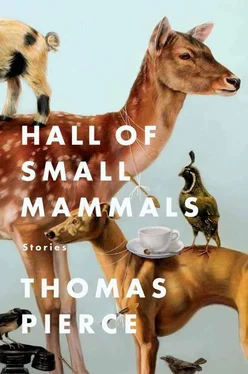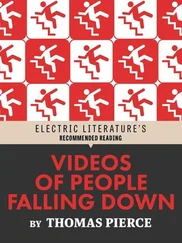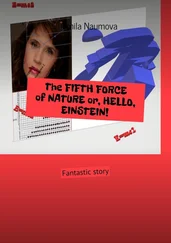“You told a good one,” Felix says, and sets his son down gently. The boy smooths out his shirt. “Let’s talk about these tights. What’s going on? And where can I get myself a pair?”
Hank walks to the platform’s edge and steps off. Shit. God. But no, the fall is barely five feet, and Hank is fine. It seems that he does this all the time. He lands on all fours, catlike, then sprints across the yard. Bet follows him up to the house. Felix approaches the brink, gazes down at the patchy grass. “I guess I’ll jump down too,” he says to Laura.
“Your choice,” she says, “but don’t ask me to take you to the emergency room when you break your ankle. I won’t do it.” She turns for the house without him and climbs the grassy hill to the patio door. Felix takes out his pen and finishes the H and then lays the metal hamster there beside it, a terrible gift. But he’s still here, in Atlanta, and he has more time to make it up to the boy. He considers the distance to the ground, which really isn’t so far, just a few measly feet. The yard is quiet and empty now. A bright glare across all the windows on the first floor of the house makes it impossible to tell if there’s anyone left to watch him drop.
Videos of People Falling Down
How NOT to Ride Down Stairs HUGE FALL
A boy with floppy brown hair and freckled arms pedals his mountain bike toward some concrete steps outside of a high school. There are twenty-five steps, and they lead down to the teacher’s lot. The boy’s friends are waiting at the bottom to see what happens. When he reaches the first step, he leans back in his seat to keep from toppling over the handlebars. His name is Davy, and he can draw a hand perfectly. Nobody draws a hand like Davy. His art teacher wants him to apply to art schools next year. She believes one day Davy will draw not only a perfect hand but also a perfect wrist and a perfect arm and, if he is diligent, a perfect shoulder too. Beyond that she dares not hope. Necks are the most beautiful part of the female body, and no one has ever captured one as it really is.
The art teacher possesses a neck more elegant than most. If it wasn’t indecent, she’d pose for Davy. At the moment of his stunt, she is locking up her room, a box of school-bought art supplies under her arm. She doesn’t see Davy fall, but she’s the first adult on the scene. Davy is conscious, on his back across the bottom three steps. She orders him not to move an inch. The bone has punctured the pale skin of his left arm. She calls the ambulance and follows it all the way to the hospital in her beat-up Acura. In the emergency room, she finds a seat beside a big man whose leg is wrapped in a bloody towel. The teenager to her right doesn’t cover his mouth when he coughs. She flips through a Golf Digest . The old woman across from her is reading a novel with bees on the cover. “What happens in it?” she asks the woman, and the woman says, “Two beekeepers fall in love but it’s impossible for them to be together.”
Old Woman FALLS into Polar Bear Habitat
The book about beekeepers is Now a Major Motion Picture starring Julia Roberts. “Swimming,” one of the songs on its sound track, has become very popular on the radio. The song was written and performed by Simon Punch, a whisper-voiced guitarist with a hip Rasputin beard and a long thumbnail painted black, and the lyrics are based on something that happened to him as a boy at the zoo with his grandmother.
They were watching two polar bears paddle around in a clear blue pool when she leaned too far over the concrete wall for a photograph and fell eight feet down into the water. Simon was too young to do anything but watch as she splashed and screamed, scraping at the wall like a lunatic. A crowd formed. A man dangled his jacket down to her and she grabbed hold of it. Because she wasn’t strong enough to hold on for very long she kept plunking back down into the water. A lady who worked for the zoo ran over with a bucket and tossed fish parts into the pit to keep the polar bears distracted, but one of the bears lunged and bit his grandmother’s leg. When she finally emerged over the concrete wall — dripping wet, bleeding, embarrassed — they ripped away her pants and discovered that the bite wound, thank God, wasn’t life-threatening. Still, all these years later, Simon sometimes dreams about polar bears. They come after him with impossibly large teeth and suffocative fur. They chase him down streets and up stairs — to the perimeter of his dreams. When he wakes he can feel their chilly wet breath on his neck.
Stupid People Falling Ouch Try Not to Laugh
A man is on his way to meet a friend for a late drink and stops at an ATM for some cash. His wallet is ridiculously fat — not with cash but with movie stubs, wads of receipts that he will never actually sort, a photo of his wife, a photo of his long-dead basset hound, and all his cards: the Anthem insurance card, the library card, the one-year pass to the contemporary art museum, and of course his many credit cards. The bank is closed for the night. The lights are off in the main lobby. The ATM is not directly on the street but in a small glass anteroom. Accessing it after hours requires that you slide your bank card into the slot by the door.
The man inserts his card, and a tiny light above it flashes red three times. He inserts his card again and pulls it back out more deliberately. The light blinks red again.
His name is Marshall, and he manages a nearby stationery shop. He is also an accomplished cellist. He is third chair in the city symphony. His favorite composer is Brahms. Sometimes when he hears Hungarian Dance No. 5 he has a funny feeling that is difficult to explain to others. He’s told only one or two people about it. The feeling involves the possibility of a past life.
Through the thick bulletproof glass, faintly, Marshall can hear music playing — not Brahms but something else. It’s that Simon Punch song, he realizes, the one from the Julia Roberts movie about beekeepers. He consults the pictogram on the card reader to make sure his card was properly oriented. He rubs the magnetic strip back and forth across his pleated khakis to make sure it wasn’t dirty and then he inserts it again. The red light flashes. Maybe something is wrong with the reader or with the ATM behind the glass. Maybe it’s out of order and the bank forgot to hang up a sign. A woman with jangly gold earrings approaches with clacking cowboy boots.
“Let me guess,” she says. “Broken?”
“Might be,” he says, and steps aside so she can try her own card.
Her card is silver. She slides it in the slot and pulls it back out hard and fast, and when it flashes red, she does it again, hard and fast. Marshall can’t help drawing certain conclusions about this woman. He pictures the woman naked and on top. The light flashes red, red, red.
“What a piece of shit,” she says. The woman looks to be in her forties. She taps the bottom of the door with her stiff boot toe. She has on way too much mascara. It’s like her eyes are at the back of a dark cave. “There’s another machine around the corner outside a liquor store,” she says, “but it’ll charge you a hundred dollars practically.”
“If it’s broken, they should have put out a sign,” he says.
“I only need like ten dollars.”
If he had ten dollars, Marshall would give it to her. They stand there, peering through the glass for a few more moments, the traffic moving lazily behind them on the street. Marshall imagines throwing something at the glass, shattering it, the two of them stepping through together triumphantly.
The woman pushes at the door without sliding in her card at all. It opens, magically. The red light was meaningless; the room was unlocked all along. They roll their eyes at each other: Of course it was open! She goes in first, and he waves her toward the machine. He says, “Be my guest.”
Читать дальше












